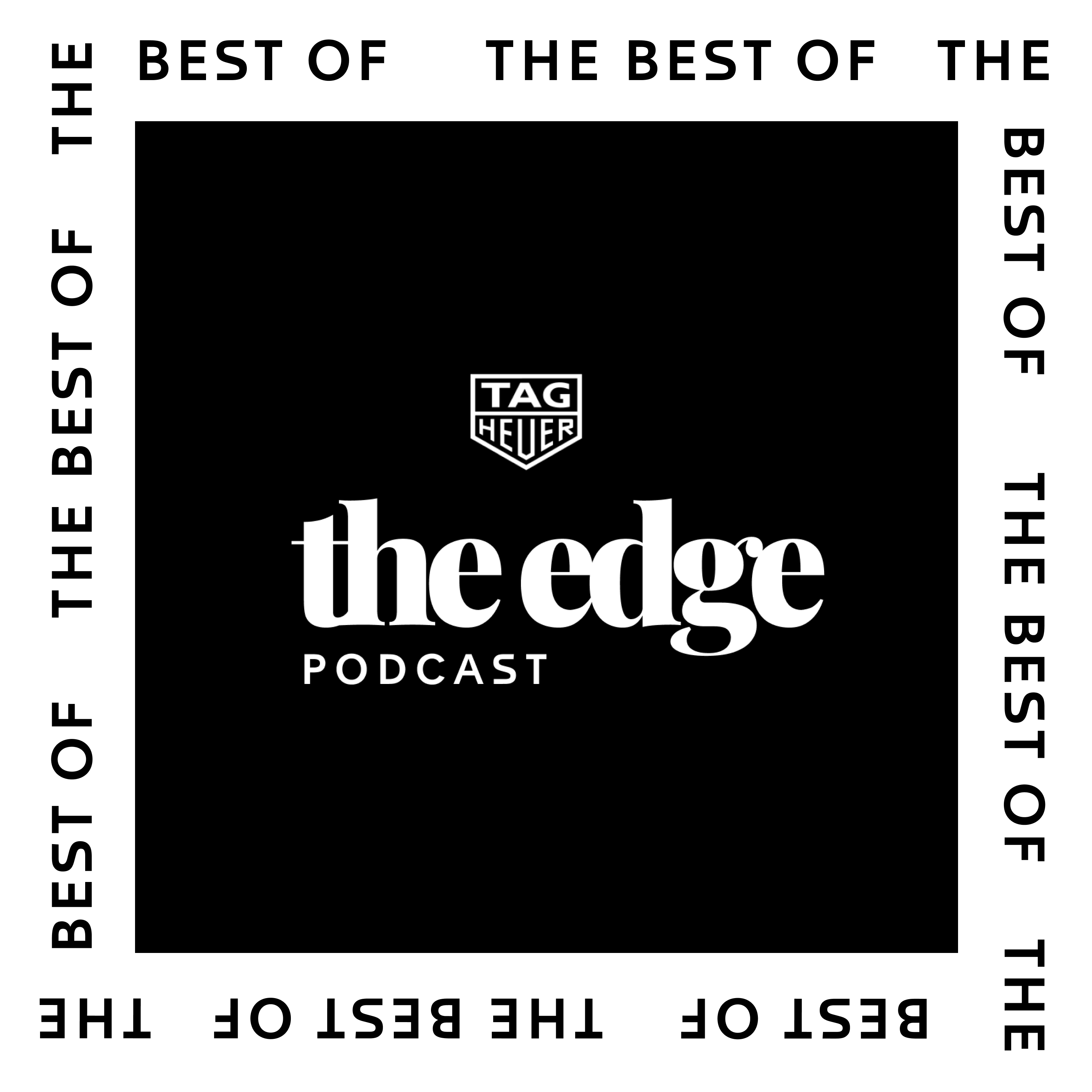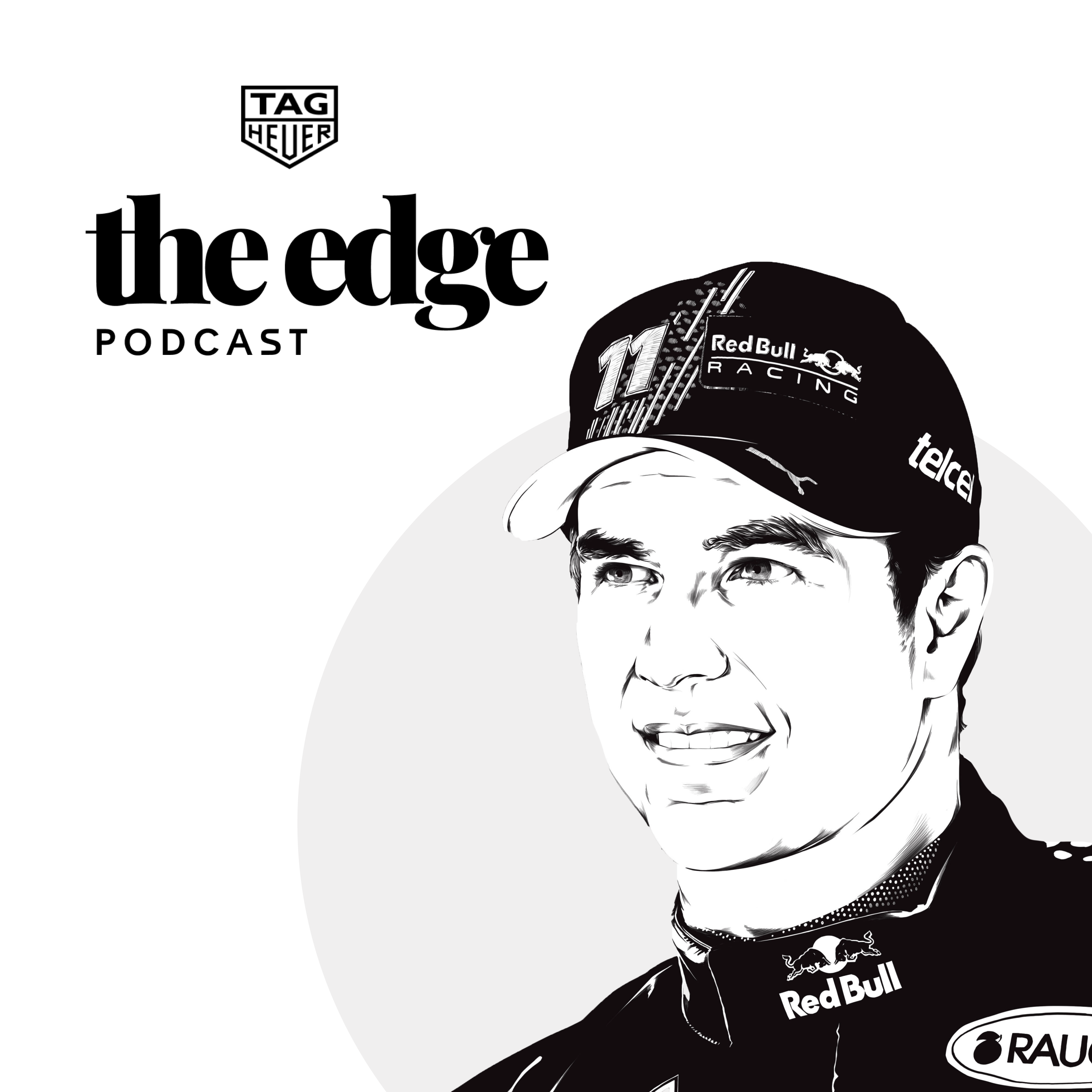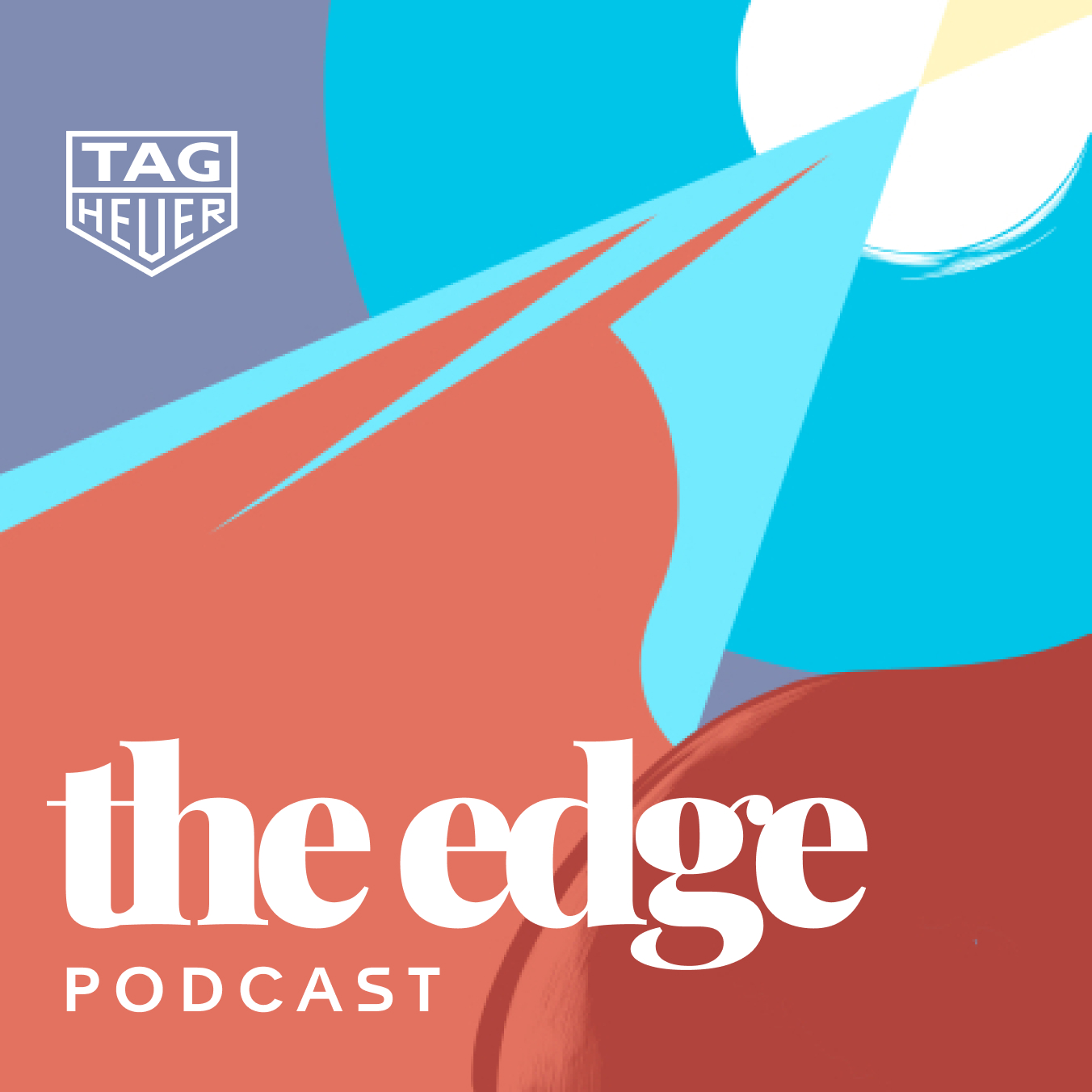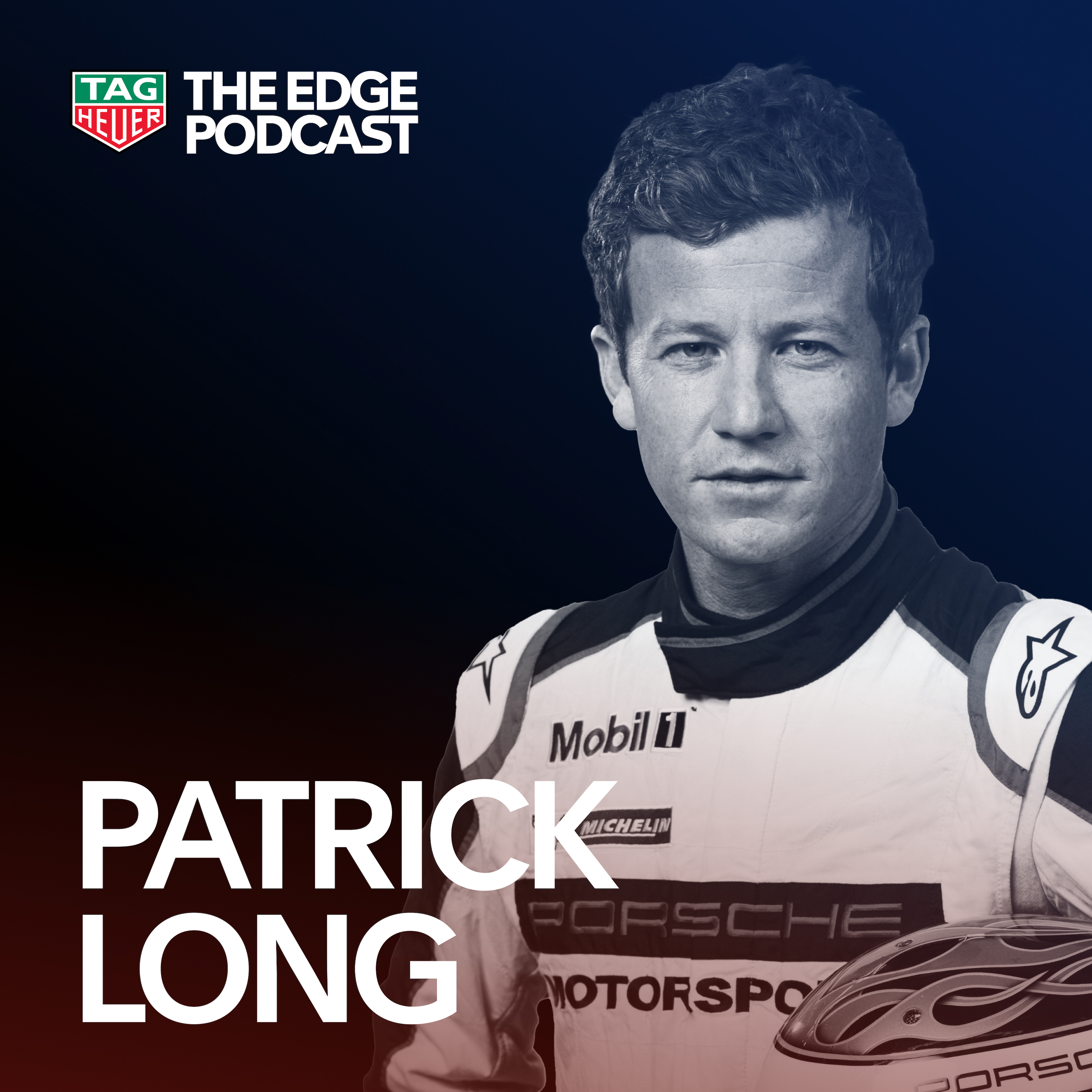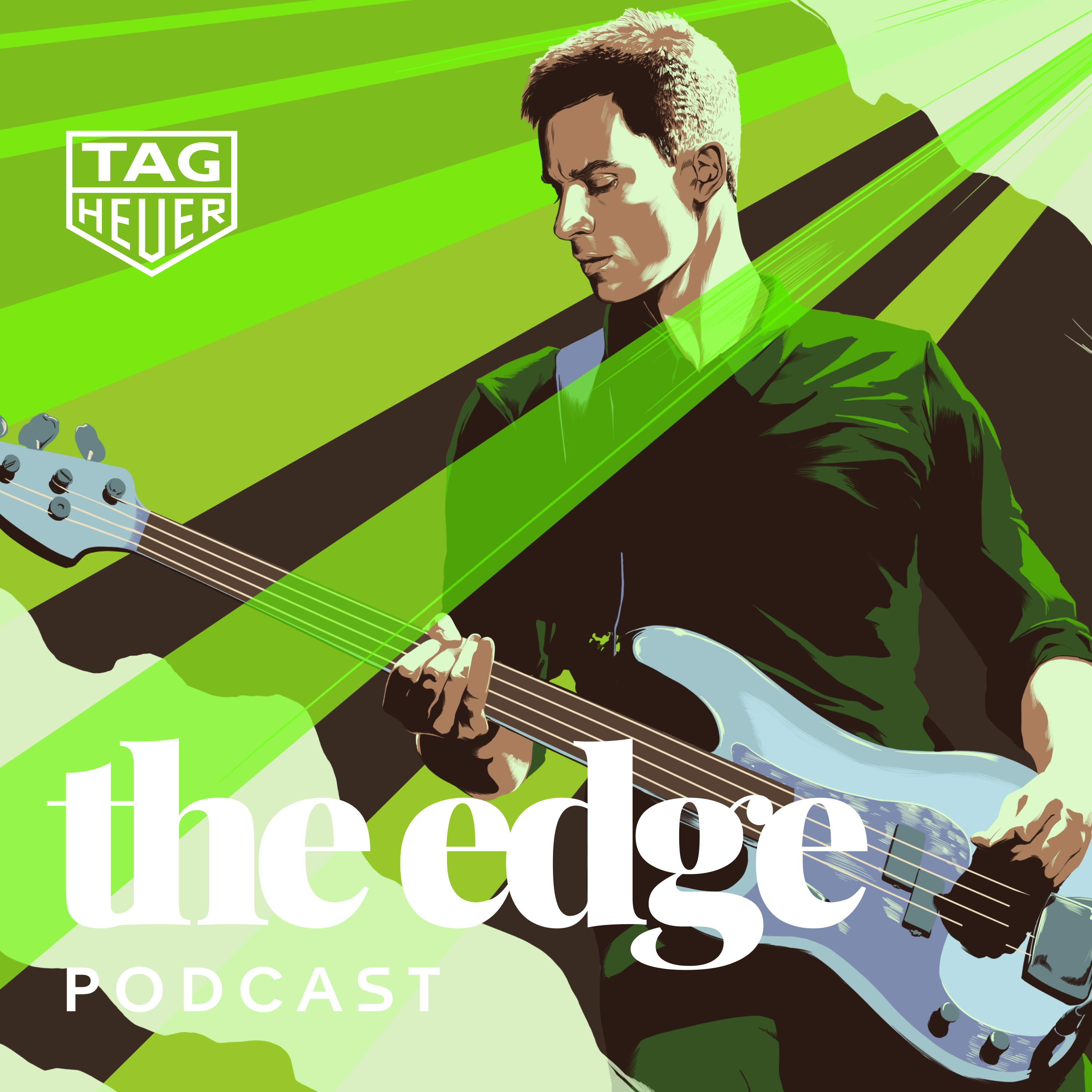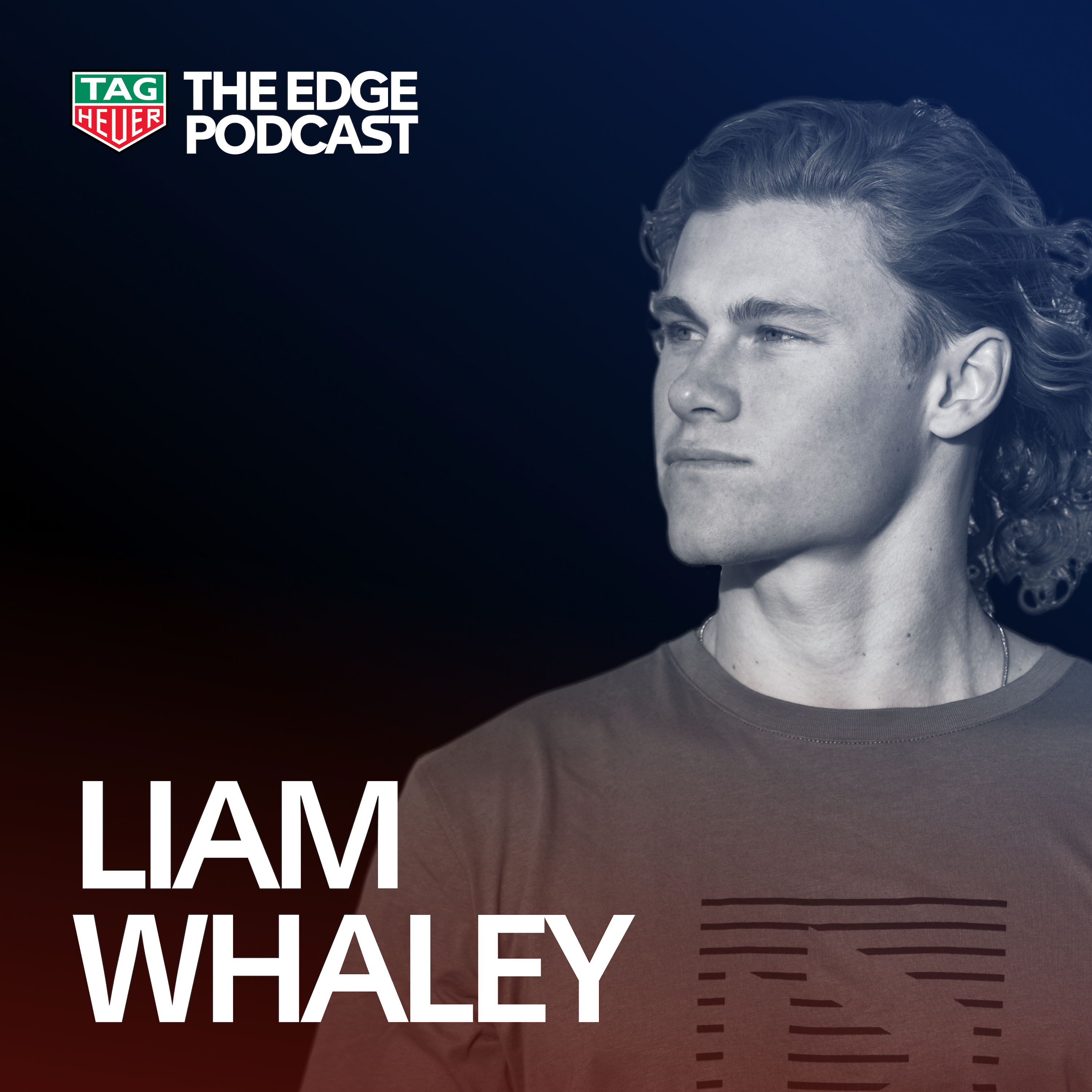Episode Transcript
Speaker 0 00:00:01 Hello, I'm te van BRCA. Today is a special episode because it's already the final installment of our first season at the edge to wrap up this series. I wanted to highlight some of the most inspiring moments we've experienced with our remarkable guests, the artists, athletes, and entrepreneurs. We've welcomed onto the show during its first 11 episodes. To name only two. I was struck by the extraordinary commitment of footballers, ally Krieger, and Ashlyn Harris, as well as surfer Myer, GBE three women who above and beyond their record breaking sports performances, managed to defend their values and take their fight for the future of equality in sports to center a stage this season, we were also on the very edge of our seats with the thrilling stories and mind bending fearlessness of surfer, Kyle Leny and free diving champion, Arter Ghan Burley. We dive deep into the importance of human connection in high level sport with the story of the formula, one team manager, Christine Horner, and tennis player, Felix, Oja a, and that's before we even mention the legends that are Patrick Dempsey, Tommy Fleetwood, Neil, Johnny, Derek bell, Bruno Fernandez, Juan matter, Jesse Lingard and Sergio Perez interviews that open new doors into the minds and hearts of these groundbreaking competitors.
Speaker 0 00:01:22 Each conversation helped us to understand a little better, what it takes to surpass oneself, to transcend limitations. With this special episode, I wanted to thank all of our guests for everything they so generously shared with us during the first season of the edge, we look forward to many more fascinating conversations to come welcome. This is the edge, a podcast by tag Hoya. What gives us our edge and how do we go beyond it? How thin is the line between taking part and tipping into victory? What inspires those moments of rare advantage down to the millimeter down to the microsecond that change the shape of a race? Is it faith, talent focus, or sheer determination, a winners born or made, and what happens when things go wrong or when it all goes right, welcome to the edge. We'll be talking to people operating at the very edge of possibility from athletes to actors and from artists to entrepreneurs. I'm your host te van and BRCA, and we'll be giving you the fuel. You need to get in the zone and leave your limits in the dust. Watch out. This is the edge, a podcast by tag Hoya
Speaker 0 00:02:50 For this extract, you'll be hearing my interview with ally Krieger and Ashlyn Harris partners on and off the pitch. I found the journey of these two American football players, particularly inspiring
Speaker 0 00:03:04 In terms of what you've done for soccer globally. I mean, and obviously there's a bit, there's a much bigger kind of machine around it also, but you have kind of been instrumental than bringing that popularity to it. You know, it was over a billion viewers, um, at the 2019 world cup, which is extraordinary. And on that subject of equal pay, I mean, I know that there's a appeal going through at the moment. I mean, how has, because that's a lot of extra pressure, you know, already you're playing for your national team, you're playing for your local team. Uh, but then also you've got, and also you've got the LGBTQ stuff that we will talk about, um, soon, but you know, it's a lot to take on D does it, does it get, does it get too much occasionally and how do you manage it
Speaker 3 00:03:45 When you create this beast? Let's just call it this brand, this outspoken beast. There's a lot of responsibility that comes with it. I think in the past, um, a lot of athletes didn't have this big of an influence on culture or politics or using their platform to speak up about real, real issues. So yeah, I think there is a lot that comes with being, I guess, what most people call a role model, right? Mm-hmm, <affirmative>, I think, um, you've got two options. You can be a role model who just focuses on sport and that's kind of their path and their gateway. And, and then you've got people who are really pushing the envelope and being outspoken more outside of sport. So I just think it's really interesting where Allie and I have tried to create balance. I think balance is the biggest key here for us.
Speaker 3 00:04:43 We wanna do so many great things, but we know we can't move the needle overnight. It's a commitment we have to commit to every single day of pushing female culture forward here in the United States and globally. And I know that we can't carry everything on our back, especially with the BTQ plus community being, um, same sex parents with a black child. Mm-hmm, <affirmative> like, there's so much that we wanna change in our culture that we know is gonna be a lifelong commitment. And if we wake up and we commit to that every day to be not only great partners, great parents, great soccer players, we will be okay if we commit to just doing the small things every single day and do actionable steps. So saying we want something done is one thing, but doing it and making it happen is another thing. And I think ally and I commit to actionable steps to creating a, be honestly just a better world for all of us.
Speaker 3 00:05:46 It's not just about sport. Um, so I think balance is the key, right? I think there's days we wake up and we're like, holy smokes. We're, we're so exhausted. We need energy for each other and we need energy for a child. So then we just have to take time to rest. So when we're tired, we take time to rest, but when we're ready to keep knocking down doors, we do it. And that's something we've committed to as a brand, as a couple as new parents. Um, so I just think for me, it comes down to balance. Um, I think Ali and I, what make us very unique is we're willing to go to deep, dark places to perfect our craft. I think that's what makes us one percenters, but we also need to be realistic. Right. And think finding that balance is the key to, I don't know, just happiness in a lot of ways.
Speaker 0 00:06:42 Mm-hmm <affirmative> Ali. Did you have any, any thoughts that you wanted to add?
Speaker 4 00:06:46 Yeah, I mean, I, I agree with obviously what Ash had said, but the only thing I'll add is that the work for us is never done. And so we have to be willing to do this, um, every single day and, um, you know, until we're no longer here and I feel like we are willing to do that. And I think everyone, you know, should want to better themselves every single day and better our community every single day and, and really have these tough conversations to help us all live in a safer, more accepting, exciting, nice, enjoyable place to live. Um, and that's what we're committed to. And I know we are tired all a lot of the time, but the work is worth it and it's changing lives and it's supporting communities. Um, you know, whether that be the black community, the LGBTQ community, um, our soccer community, it's, it's really something that we've committed to. And so the work is never done and there's always something to do to better, you know, the space that we live in. And so I think we're really committed to that.
Speaker 0 00:07:59 Arthur Guam is a complete athlete. He accumulates titles and apnea records and demonstrates an Olympian calm when it comes to facing extreme conditions. Ice water is a playground for him. And I wanted you to listen to this story of an extraordinary moment, his attempt to break a new world record. <laugh> now you're underwater, you've taken the plunge. What are you feeling? Where is your head? What is your instincts in those first moments? How, how are you feeling
Speaker 5 00:08:32 Well before? Just before to go, I take my last breath. Um, I give up with all my last thoughts about what's going to happen. Um, I abandon myself actually to, to something, uh, I don't know that transcends me a little bit, you know? Mm. Uh, no fear anymore. I go and, uh, we'll see <laugh>, but I'm, I'm very confident, uh, at that moment. Um, and then I go and for a certain time, which will be probably around 30 meters, 25 to 35 meters, let's say I will be very comfortable. Okay. So I will be in this kind of state in which I was just before to go, like very hypnotic, very relaxed, the thoughts coming in and going, you know, and, uh, you know, very, very fuzzy, actually very, uh, very comfortable and suddenly the urge to breathe is going to pop, right. And then all the reality is going to come back straight to my mind and my body. And from this moment until the end of the dive, it'll be a very long process of, uh, undertaking myself in, uh, this kind of very specific, uh, efforts, which is, uh, trying to, uh, overpass a, uh, a surviving riff, which is the breathing envy. And it's only mental. It's only about mental strength, that's it? So, uh, well, I don't know. It's just, uh, leaving my brain on the side and uh, <laugh> and keep going, you know,
Speaker 0 00:10:32 <laugh>, I mean, I'd, I'm thinking if I'm running and I really wanna stop and like, come on mate, come on. Do, do you talk to yourself?
Speaker 5 00:10:38 That's, that's
Speaker 0 00:10:39 It, you're just saying, can
Speaker 5 00:10:40 You do this? Yeah, that's it. But it's about mental strength and about, uh, staring as staying as relaxed as you can as well. Mm. This is what is very strange and freediving, it's not like, okay, now, now you're gonna go. And like, you push yourself and, um, and, uh, you, um, and you translate it to your, to your body, like getting more dynamic and forcing more. And, uh, no, you have to do it for your brain for your mental strength, but you have, besides of it to, uh, keep your body in this kind of relaxation state, as long as you can. Wow. You know what I mean? Yeah. This is very, uh,
Speaker 0 00:11:25 There's a duality to it.
Speaker 5 00:11:27 Yeah, exactly.
Speaker 0 00:11:28 The challenge. Um, what are you kind of sensory wise? What are you seeing? What are you hearing? Are there people cheering? Is there someone above you? Are you hearing, I dunno, dolphin noises <laugh>
Speaker 5 00:11:39 No, no. Under the ice, it's very, very, very strange in frozen lakes because you it's, it's, uh, one of the only places on earth where, where I have experienced this kind of silent. Okay. It's uh, it's scary a little bit, really. Yeah. You, you, you, there is not a single sound. It's very strange. You can, you can hear everything, your movements in the water, the water sliding on your skin, your heartbeats, uh, you hear everything because, uh, there is not a single sound. Wow. Yeah, this is very strange. <laugh> yeah, but this is an incredible experience to leave.
Speaker 0 00:12:25 Christian Horner was one of our first guests in season one, eight times, winner of the winning F1 team title. The red bull racing team manager spoke to us about his relationship with racing, but also how to reconcile family life and the demands of high level sport. Um, we just touched on family Christian. What, what would you say if there are any other parallels between, between being the head of an F1 team and being a father?
Speaker 6 00:12:53 Well, sometimes, you know, needing to take a father, he starts with the drivers, um, can be quite similar to being with the children. Um, but, uh, no, I mean, look, um, I think that when I first came into the sport, um, my drivers were older than I was now. I'm old enough to be the driver's father. I raced against Max's mom, um, who was a very competitive car driver. Um, so, uh, yeah, the dynamics have changed, but you know, you don't see them as, as, as younger or older as I, it comes back to earlier question that I think ages irrelevant. It's how you handle yourself, how you hold yourself and, and, uh, yeah. You know, that's, uh, age is just a number, then
Speaker 0 00:13:40 What would you say has been the biggest challenge or unexpected challenge that life has thrown at you thus far? And in turn, how did you overcome it?
Speaker 6 00:13:49 Uh, there's challenges every day, every, every week. Um, and I think to overcome it first, you have to understand it and you just have to apply yourself. And I think, you know, worry about the things that you can control and not the things that you can't. Um, and I think that, uh, you know, take things one step at a time. Um, you know, it's, uh, you're never gonna build Roman a day and, and you've just gotta go piece by piece. And I think that that's the same with any challenge that we face, you know, within formal one is first of all, understand what that challenge is, what your weakness is, and then try and address that and build on your strengths.
Speaker 0 00:14:28 Um, you, you strike me as a very kind of calm person who, who doesn't seem to get riled. I mean, this podcast is the edge and we talk about kind of people operating at the edge and the extremes of what they do, which you certainly do. I mean, you're operating at the highest level in formula one. Um, what is the moment that you felt most closely pushed to your edge?
Speaker 6 00:14:50 I think you pushed the push to the edge, you know, in sport. I think as you get older, you get more experience. You, you learn to deal with situations perhaps slightly differently, but, uh, of course, you know, you are, when you're competing for grand pre victories, you are always, you know, on the limit. Uh, and if you're on not on the limit, you won't be winning. So, um, it's just getting comfortable with living your life there. And, uh, as I say, I think experience helps with that.
Speaker 0 00:15:23 You can only come away impressed by Brazilian two time world surfing champion, my GBE, when you see her face gigantic waves with such cool and control. And then when you learn about her work to preserve our oceans, your respect for her only grows. Can we talk a little bit about your ocean conservation work? Cause I mean, you know, I, I spoke, I spoke to Lenny about this, um, a couple about a month ago and he was kind of talking to me about the microplastics in the sea and it just, it painted a very, very bleak picture. Do you, do you kind of have the same feelings on the subject and, and how are you trying to tackle it?
Speaker 7 00:15:58 Yeah, yeah. Well, it's a, it's a very big subject and, and we are in a phase where, you know, we kind of still have hope, but there is big changes that have to be made. Um, in the next few years, I, you know, I'm in the board of director for Oceana. So I am constantly aware of our campaigns of the big issues and I get to vote and I get to discuss them in, in the board. And, and so I really love to, to know what, what, where we are working, what we are working, um, a lot of, um, overfishing, bycatch, microplastic, um, climate change. Those are the main subjects, um, things that I see in my daily life, you know, also because I work here in a fishing village, I live in a fishing village, so I see the changes for the fishermen. Um, and, and also I see the plastic, I surf with the plastic, I get plastic and, and fishing, um, ropes and, and, and fishing gear into my propel and the jet ski all the time. So it's in my daily life, but you know, I, for me, I believe, you know, the work we do in Oana is kind of what, what most makes sense is, is about changing laws. It's about rewriting the laws. It's about how the government is taking care of our oceans. I think, you know, as consumers, as people, we can do our part, but we definitely have to change a lot of the constitution, the, the, the legislation to protect our oceans and, and our, our Marine life and biodiversity.
Speaker 0 00:17:49 Do you feel optimistic about it?
Speaker 7 00:17:52 Um, yes. If I didn't feel optimistic, I wouldn't work on it. <laugh>, it'd be kind of a waste of time. <laugh>
Speaker 0 00:17:58 Yeah, that's
Speaker 7 00:17:59 True. I could be surfing instead. Um, that's true. Yeah. I feel, I feel optimistic because, um, there is ways there is ways to turn around the tide and, and, um, there is people that are working, um, extensively to do it, and I hope I can, I can help in my little way to push the agenda forward and to, you know, reestablish, um, what the ocean used to have, you know, biodiversity, lots of fish, lots of life and, and last plastic.
Speaker 0 00:18:36 Um, <laugh>, it's probably a, a question you get asked a lot by a lot of surfing novices, but, um, on the subject of, uh, biodiversity, have you had many shark encounters?
Speaker 7 00:18:48 I had a couple, um, I have swam also, uh, with sharks in Hawaii. I think they're lovely, lovely animals. I do. I would get scared if it's, um, in an area that I know that they attack. Usually if it's in areas that I know that they're not, um, that they don't attack so often, like I don't get scared, but, you know, they are, they are an extremely necessary part of our ecosystem. So I am a big defender of sharks and, and, um, and a, a big Nono for the fin rating.
Speaker 0 00:19:28 Felix Ojay Alii is only 21 years old, and yet he's already made a name for himself on clay courts around the world. I was impressed by his extraordinary determination at such a young age and his ability to manage pressure when playing against giants of his discipline. Here's a snippet from my meeting with him. So that idea of frustration you do often see that, I mean, there are obvious, obvious examples of people that kind of epitomize that idea of frustration on the court. Um, but how do you overcome that feeling? Cause I imagine once that happens, it must be very easy for that to be a slippery slope. And for you to kind of go down from that point, how do you kind of boil yourself back up?
Speaker 8 00:20:12 Well, I haven't perfected, uh, yet. Uh, it's, it's, it's a constant work. Um, it's a constant work, uh, of being able to control more and more your emotions, your ideas, being able to play every point almost in the same way, uh, where, you know, you're able to, to <affirmative> to refocus, um, before every point. And, uh, it's, it's a constant work really. So I would say in the past I've done well and I felt like I've improved and I've always had a, a pretty, uh, I would say cold ahead or I was pretty calm, uh, naturally, but, uh, it's not always easy when you start losing, let's say confidence on a shot during a match, or you start getting frustrated because you had chances and you missed them to be able to really stick in a present and not get frustrated from the past and anxious of the future, you know, and to be really in that, uh, specific zone of, of, of the present moment is, um, is a constant balance. You know, and course, I don't think anybody has perfected it yet, but you always have to aim for that. You have to aim for it at least.
Speaker 0 00:21:30 I mean, it's, it's kind of interesting cuz that is mindfulness, right? It's like, you know, we'd suddenly talk about this much more in kind of wider society, but that's what everyone is kind of striving for to live in the moment. You know, and I think this, it feels like a real kind of drill down into that notion, which I mean, it's kind of,
Speaker 8 00:21:49 That's really what it is and it's valid for many things in life, but uh, for us as players, it's, uh, even more because we're faced with the truth every time we're faced with the fact that, um, you know, somebody's gonna win, somebody's gonna lose and it's straight competition sometimes I think in a day to day life, these things are more hidden because you can get away with it or you can decide, well, okay, today I'm not I'm okay. I don't feel good. I'm not gonna do much. I'm gonna, you know, uh, stay at home and I'm gonna do what I need to do tomorrow. But when the day of the match comes, uh, you have to deal with, uh, however you feel you have to deal with your frustrations. You have to feel with your temper, your mood, whatever it is, and you have to do the best with it.
Speaker 8 00:22:33 So I think this competition and this world, or tennis for me teaches me how to stay more and more in the present. And um, like I, I, I think I might have mentioned it earlier, but a phrase that I read that, you know, stuck with me is that in the end, where do we get frustration from is from the past? You know, we only get frustration. If you stay in the past, you're gonna be frustrated. And if you live in the future, you will be anxious. Right. Uh, so kind of, um, finding that middle ground is, uh, is something, uh, uh, I work on and something that, um, I always aim for
Speaker 0 00:23:17 Surfer, Kai Lenny, eight time world champion travels the world in search with the biggest waves imaginable. The joy he conveys when he talks about his sport is intoxicating. I hope you enjoy listening to it as much as I did recording it. Kai, thank you so much for joining us here at the edge. Uh, it's exciting to have you here because obviously you are the, one of the leading lights that if not the leading light in surfing around the world, you're considered by many, um, as the ultimate Waterman, uh, which is a new term to me actually. Um, you're an accomplished big wave surfer, kite surfer, towing surfer, fo surfer, windsurfer paddleboard. Please forgive me if I've got any of those terms wrong. <laugh> as I imagine, I probably have, um, and all under the age of 30, obviously you are a water sports polymath. Like, I mean, you literally can do anything and everything. Um, is there any, are there any sports specifically war sports that you haven't tried yet that you wanna do? Maybe something that's a little bit slower <laugh> perhaps, or is not I D is that not where your head's at?
Speaker 9 00:24:17 I think my head's always about going as fast as possible speed. I mean, I've always wanted to go in a fighter jet because I remember I was surfing out at Nazare and the waves were just giant. And I was thinking, man, this is pretty gnarly. Like, this is probably on the edge of like, what people would think is insane. You know, like the waves are 80, 90 feet and you see the 50,000 people on the cliff and you're like, oh my goodness. And then all of a sudden, the Portuguese air force come flying over the lineup and break the sound barrier and just like go a th like whatever, mock, whatever it is, mock two mock three. And I'm like, okay, all of a sudden that's grounded me. And I realized that's probably the coolest thing in the world you could do as a human is fly one of those fighter jets and go the speed of sound.
Speaker 9 00:25:09 Uh, and then it actually was nice cuz it took the pressure off of surfing big waves. Now it's just like having fun cuz it was like, oh, this isn't really even that cool. So I mean, I think I've already missed the boat for flying those kind of things. Uh, but just to go for a riding, what you need. Um, and then I, I, it's funny, I take a lot of inspiration though beyond surfing sports sports, for sure. Like snowboarding I'm heavily influenced by for my big wave riding, but even sports like formula one and Moto GP, you know, I, I drive my car to the beach, but I'm not racing cars nor am I riding motorcycles, you know, at insane speeds around corners. But those two sports for example, are very inspiring and then, you know, motocros is also inspiring to, you know, my windsurfing and stuff because it's like, wow, that's the tricks they're doing. I can apply to my windsurfing. Um, but you know, it's just, I try to take inspiration from all sorts of sports. I mean, I think everybody that I know as
Speaker 0 00:26:10 Long as they're fast.
Speaker 9 00:26:11 Yeah. As long as they're fast, I mean ideally in a perfect world I'd RA I would like to be as fast with just my body as like Bruce Lee, you know, you see, you can like play ping pong with numb chucks. That's pretty radical. I would love to do that. But I think that takes like a lifetime of training, which I think I'd rather put my lifetime of training towards surfing or riding waves at least.
Speaker 0 00:26:35 Sure. Um, you just talked about Nazare. I mean, there's that amazing video. The, you, that kind of went viral right? Where you were swept up and swept away by this insane wave. It's enormous wave. Um, the first question I guess is how do you get back in the water off something like that. And secondly, what was it your scariest moment? And if not, what was,
Speaker 9 00:26:58 I mean it definitely that wipe out out at Nazare was, was not my scariest by any means. It was, I always call it just mildly and convenient when you get pounded by these big waves. I mean, I trained for these moments, so, and knock on wood. I've never once felt like I was going to die in the ocean, um, or drown or anything. I always felt like, gosh, I just gotta go through this kind of experience and I'll end up out the end. And it is just kind of going through kind of the chaos of it all. Um, and that experience, I was toe surfing and it was the biggest day of the year. This is back in October, um, biggest day maybe ever. It was the, some of the biggest waves I had ever seen. And I'm like, I would love to take people for a ride with me.
Speaker 9 00:27:43 So I held my GoPro with a pole Mount and I was just like, all right, I'm, I'm gonna try to get some, the craziest GoPro footage ever. And I love the GoPro so much, but it can tend to make the waves look a lot smaller than they are. Um, but I was like, okay, on a day like this, if the waves are a hundred feet, it's gonna have to look huge. And so I remember dropping into the wave and uh, the wave just kind of ate me alive because you know, you can only go if, if the wave goes sideways basically, or it doesn't do what you're thinking' gonna do, you can easily get taken out. And I thought, wow, this is the greatest opportunity ever, not one that I would volunteer to do, but now that I'm forced to do it, I get to film being caught inside by 50, 60 foot waves.
Speaker 9 00:28:28 Okay. See, I'm gonna film the whole thing. And somehow in some sadistic way, it kind of gave me hope, like filming myself get absolutely destroyed was like something that I could latch onto mentally. Um, you know, a lot of times you're sitting there and you're all alone and it's crazy because the cliff is right there and you see 50,000 people who are comfortably sitting and watching this whole experience. And you're just absolutely getting annihilated. Like you're in, you know, a thunder dome or something, or you're in the Coliseum and your friends who are on jet skis trying to get to you. They're so close yet. So far away that you just can't get to you in time before the next wave. And you only have maybe eight seconds to take a couple breaths before the next wave hits you on the head. And the whole time I'm like, just don't lose the GoPro and just film everything.
Speaker 9 00:29:22 And I just death grip it through that whole experience. And I I'll say when I got picked up after four waves, I was just so stoked. Not because I was getting saved, but because I filmed the whole thing, I'm like, yes, I got the footage. And I purposely didn't watch that footage for like three or four days because I was like, I had the experience of what it was so clearly in my head. I didn't want it to like my memory to become what the video was, if that makes sense. And sure. So when I saw the video, I'm like, gosh, it felt way bigger and way NA earlier. But at least I was able to give people just a glimpse of what it's like, because, um, you know, I get to see things that my friends go through and I just always wish I, I was able to capture the, the sensation or the feeling, um, because I think people would be tripped out by it.
Speaker 0 00:30:25 Thank you all for listening to this best of compilation episode and for being there with me for our first season of the edge, I'm delighted to announce that season two of the edge is coming very soon. It promises to be particularly exciting. You will hear and meet extraordinary and inspiring personalities. We will dive into one key moment. A turning point in each of my guest lives you'll feel as if you were there in those definitive moments when time stood still. In the meantime, don't forget to subscribe to the edge on Spotify, iTunes, or wherever you get your podcasts and be sure to spread the word. If you've enjoyed this season, I'm your host te Vandam BRCA stay tuned. We'll be back very soon with season two of the edge. Thank you for joining us at the edge. A podcast by tag Hoya. Don't forget to subscribe on Spotify, iTunes or wherever you get your podcasts. The edge is also an online magazine. Go to magazine dot tag, hoya.com for more articles, interviews, and photo series that bring together our love of watches and our desire to push ourselves to the edge of our limits. I'm your host te van BRCA until next time, keep an eye out. This is the edge.
